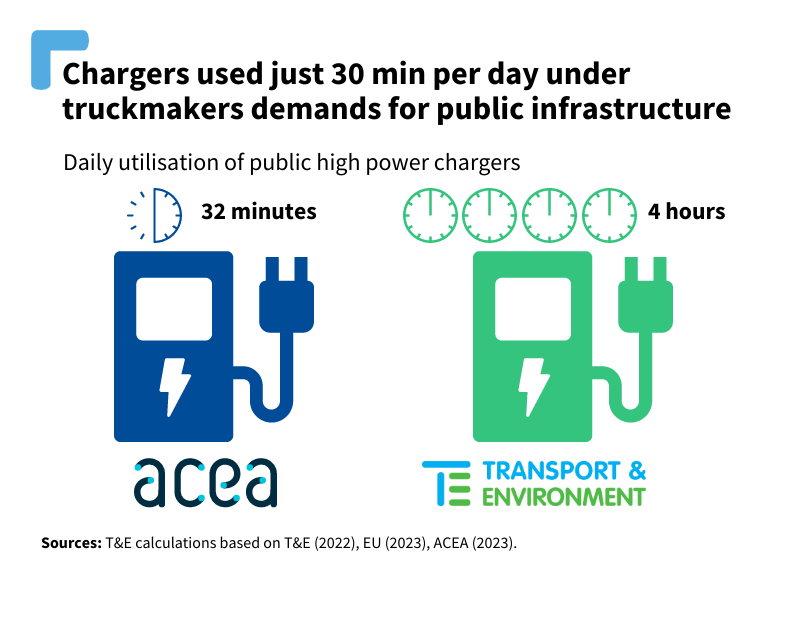Charging infrastructure is seen as the main barrier to a faster roll-out of zero-emission trucks, but new analysis of EU public charging targets finds Europe will have enough to significantly ramp up truck CO2 standards. Transport & Environment (T&E) called on lawmakers to mandate a 65% cut in truck CO2 emissions in 2030, which goes further than the EU Commission’s proposed standards and is in line with the bloc’s climate commitments.
By 2030, Europe will have 13.79 TWh of charging energy per year for heavy duty vehicles, according to T&E analysis of EU infrastructure targets and additional plans in Germany.[1] That would supply 97% of the energy needs of the electric trucks and coaches on the road if the EU set the higher target for truckmakers. A recently agreed EU law obliges member states to install at least one truck charging hub every 60-100 km along major motorways.
Fabian Sperka, vehicles policy manager at T&E, said: “Truckmaker scaremongering that there won’t be enough public charging does not stand up to scrutiny. Charging is not an obstacle to more ambitious truck climate targets. Not only will the EU’s new infrastructure law provide enough charging for the proposed 2030 CO2 standards, it enables lawmakers to go further.”
Truckmakers’ lobby group ACEA is demanding four times the public charging capacity that is needed to meet the EU Commission’s truck CO2 targets in 2030. This would result in charge points being used for just over 30 minutes a day, on average. T&E said this would lead to massive overbuilding of the charging network and that public subsidies would be needed to make it viable. Increasing the 2030 truck CO2 standard to 65% would result in public chargers being used 4 hours a day, according to the analysis.

Fabian Sperka said: “Claims that EU public charging targets are insufficient ignore the fact that electric trucks will be mostly plugged in at private chargers. Overbuilding the network would leave public chargers underutilised and require massive subsidies. Higher CO2 standards will expand the zero emissions truck fleets in line with EU climate goals while guaranteeing that public chargers are optimally used.”
MEPs and EU governments are expected to agree new truck CO2 standards by the end of the legislative term in 2024. Trucks account for just 2% of the vehicles on the road but are responsible for more than a quarter of EU road transport CO2 emissions.
Note to editors:
[1] T&E analysed the targets in the EU Alternative Infrastructure Regulation (AFIR) as well as plans for public charging in Germany, a key truck transit country, which go beyond that.
Read more:
Analysis – Fully charged for 2030


